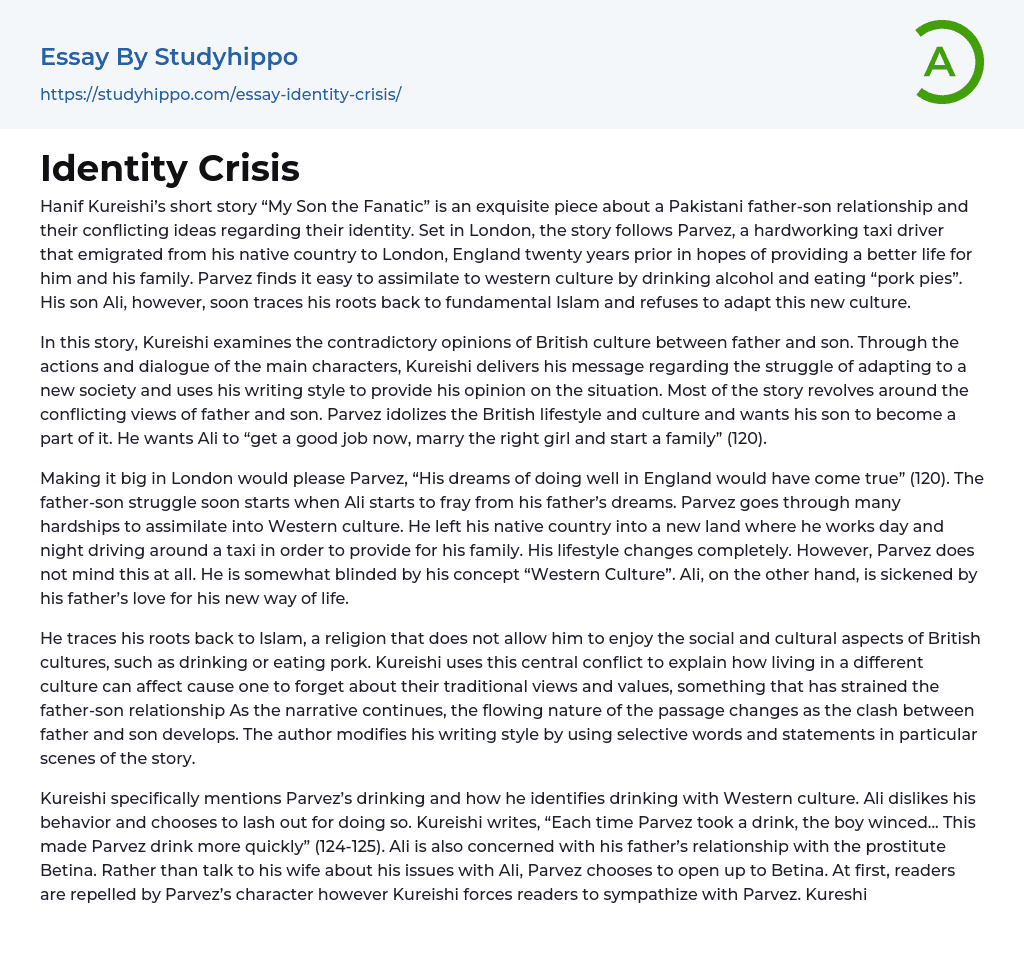Hanif Kureishi's "My Son the Fanatic" is a beautiful exploration of the relationship between a Pakistani father and son and their conflicting views on identity. The story takes place in London and follows Parvez, a hardworking taxi driver who moved from Pakistan to England twenty years ago in search of a better life for himself and his family. Although Parvez easily embraces Western culture by drinking alcohol and eating "pork pies," his son Ali reconnects with fundamental Islam and rejects this new way of life.
The story explores the opposing viewpoints on British culture held by a father and son. Kureishi uses the actions and dialogue of the main characters to convey the challenges of adjusting to a new society and expresses his own views through his writing style. Much of the narrative center
...s on the differing perspectives of the father, Parvez, and the son, Ali. Parvez idealizes British life and desires his son to embrace it, hoping for Ali to secure employment, marry a suitable partner, and establish a family.
Parvez would be pleased to achieve success in London - it would mean his dreams of prospering in England have come true (120). However, a struggle arises between father and son as Ali begins to distance himself from his father's aspirations. Parvez faces numerous difficulties as he tries to assimilate into Western society. Leaving his homeland, he works tirelessly as a taxi driver in a foreign land to support his family. His lifestyle undergoes a complete transformation, but Parvez is unconcerned by these changes and is somewhat blinded by the allure of "Western Culture". Conversely, Ali is disgusted by his
father's newfound infatuation with this way of life.
Kureishi, who follows Islam, is unable to partake in British social and cultural activities like drinking or consuming pork. This conflict illustrates how living in a different culture can lead one to abandon their traditional beliefs, causing strain in the father-son relationship. Throughout the narrative, the passage undergoes a shift as the clash between father and son intensifies. The author adjusts his writing style by employing specific words and statements in certain scenes of the story.
Kureishi discusses Parvez's drinking and how he associates it with Western culture. Ali strongly disagrees with his father's behavior and confronts him about it. Kureishi states, "Whenever Parvez drank, Ali would cringe... This only made Parvez drink even more quickly" (124-125). Ali is also worried about his father's relationship with the prostitute Betina. Rather than discussing his concerns with his wife, Parvez chooses to confide in Betina. Initially, readers are repulsed by Parvez's actions, but Kureishi encourages readers to sympathize with him. Kureshi reveals Parvez's past experiences in order to justify his behavior.
Despite his shortcomings, he is a regular man who simply wants the best for his family. Throughout the story, the clash between father and son's identities is constantly emphasized. This cultural and social conflict between them persists until the end of the short story. Even though the conflict remains unresolved, Kureishi concludes the story with a strong climax that forces readers to reflect on their beliefs and choose a side in the father-son argument. Following a heated argument, Parvez can no longer handle Ali's behavior.
Parvez physically assaults Ali in a drunken state, causing
him to have a split lip and bleed. Despite this unprovoked attack, Ali questions his father about who truly embodies extremism (131). The narrative concludes by presenting readers with a significant decision to resolve the conflict. On one hand, there is Ali, a young man who defiantly lives according to his native beliefs and culture. On the other hand, there is Parvez, an ordinary man with his own flaws, longing to assimilate into Western culture for the sake of his son's experiences.
Kureishi's story "My Son the Fanatic" presents readers with the opportunity to take a stance on the issue at hand, as depicted through the declining relationship between Parvez and Ali. The story's structure and title imply that Kureishi would align himself with Parvez, who aspires to assimilate into Western culture. Parvez's sole objective is for his son to feel accepted by society and achieve a successful future. However, his determined efforts catalyze Ali's rebellion against him. Kureishi deliberately leaves it up to readers to determine who truly embodies the fanaticism portrayed in the story.
- Cultural Identity essays
- African American essays
- African American Culture essays
- American Values essays
- Asian American essays
- Chinese essays
- Ethnicity essays
- Ethnocentrism essays
- German essays
- Han Chinese essays
- Hispanic essays
- Identity essays
- Korean essays
- Mexican essays
- Nation essays
- Native American essays
- Race and Ethnicity essays
- White People essays
- Abnormal Psychology essays
- Abraham Maslow essays
- Attachment Theory essays
- Authority essays
- Behaviorism essays
- Classical Conditioning essays
- Cognitive Psychology essays
- Counseling essays
- Developmental Psychology essays
- Educational Psychology essays
- Erik Erikson essays
- Family Therapy essays
- Jean Piaget essays
- Maslow's Hierarchy Of Needs essays
- Mental Health essays
- Operant Conditioning essays
- Personality Psychology essays
- Positive Psychology essays
- Psychoanalysis essays
- Psychotherapy essays
- Sigmund Freud essays
- Social Psychology essays
- Stanford Prison Experiment essays
- Supersize Me essays




